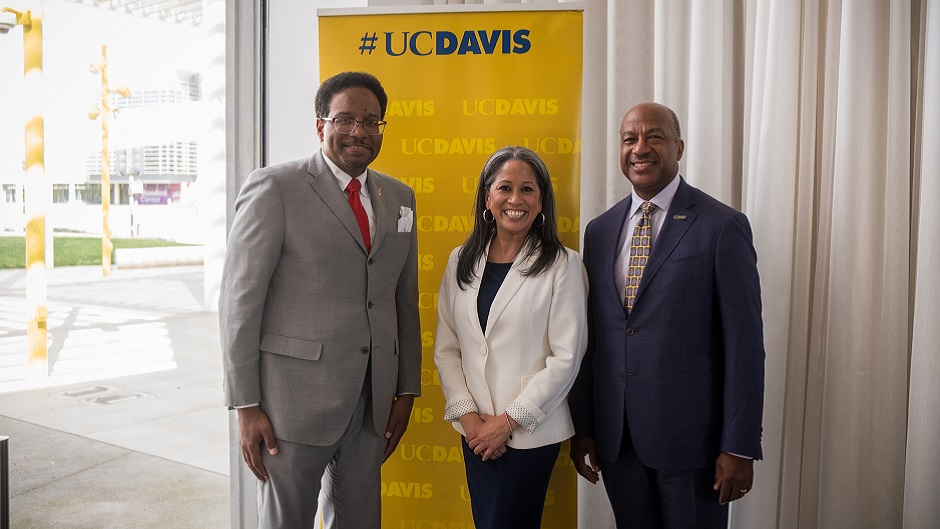Leadership, Legacy and Mentorship
 Photo credit to Lemar Deguzman/ UC Davis
Photo credit to Lemar Deguzman/ UC Davis
Leadership, Legacy and Mentorship
President Lisa Cardoza Moderates Presidential Perspectives at UC Davis Event
By Sarah Colwell
At a recent mentorship speaking event hosted by UC Davis, three distinguished leaders of higher education shared their personal stories of success and leadership in academia — and it was American River College President Lisa Cardoza who steered the conversation with warmth, clarity and purpose.
As moderator of the discussion that featured Chancellor Gary S. May of UC Davis and President Darryll J. Pines of the University of Maryland, Cardoza brought her signature blend of insight and empathy to the stage, guiding a dialogue that centered on mentorship, leadership and the evolving landscape of higher education.
The UC Davis event, presented in partnership with American River College and the University of Maryland, was free and open to the public, attracting a full in-person audience and additional participants online. Fellows from the PROMISE Engineering Institute, a program supporting underrepresented graduate students in STEM, were among those in attendance.
“I want to say that when I first walked into this room, I could feel the brilliance,” Cardoza said. “There’s a room and a Zoom room full of overachievers. We received over 50 questions before we had to stop and curate the questions into what we’re going to share this morning”.
Shaped by audience input, Cardoza’s questions informed a dynamic discussion that explored five key themes: success and leadership, networking and career advancement, mentorship, graduate school and academia, and personal development and decision making.
Reflecting on the Power of Mentors
Cardoza invited the speakers to reflect on their shared beginnings as graduate students at UC Berkeley. Her questions opened the door to compelling stories about their academic journeys, early doubts and professional growth, and even a little friendly banter.
Throughout the discussion, Cardoza also invited the audience — composed largely of graduate students, aspiring faculty, and academic leaders — to reflect on the power of mentorship and the paths that lead to academic leadership. At one point, she prompted the speakers to share how their mentors shaped their decision to enter academia rather than pursue careers in industry. Her questions uncovered vivid stories of inspiration and influence, including pivotal moments of guidance from figures like Howard Adams, Ph.D. and Augustin Esogbue, Ph.D.
“I had never run across an African American or person of African descent who was as successful as [Dr. Esogbue] who was not an athlete or entertainer,” said UC Davis Chancellor Gary May. “And that kind of blew my mind.”
Important Role of Community Colleges
Cardoza also used the opportunity to emphasize the important role that community colleges play in the academic pipeline.
“I want to take this moment to plug in the pipeline into professorship at the community college level,” she said, pointing to the opportunities and impact that institutions like American River College provide for both students and faculty.
Throughout the event, Cardoza brought attention to issues facing higher education today, including public trust, representation and the need to communicate the relevance of academic research to everyday life. Her role in the event highlighted ongoing conversations in higher education about inclusive leadership and the ways institutions engage with their communities.
The Value of Networking
Audience members, both in person and online, found the conversation inspiring and practical, according to those interviewed.
“Being in a room full of established STEM professionals, being able to see them succeed, allows me to know that I can succeed,” said DeVaughn Ogles, an adjunct engineering faculty member at American River College. “Networking is one of the most important skills that’s lost today … we sometimes forget that some of the best ways to get what you want is by simply talking to somebody else in person.”
As the event ended, Cardoza reflected on her own experience as a college student at Stanford University, highlighting how mentors shaped her own journey in academia. She encouraged attendees to continue seeking meaningful connections, to mentor others and to build a future grounded in shared purpose and possibility.
“My hope was to elevate not only the voices of the panelists,” said Cardoza, “but also the aspirations of those in the audience who might see themselves as the next generation of academic leaders.”
Sarah Colwell is a freelance writer and marketing strategist who specializes in serving higher education clients.

